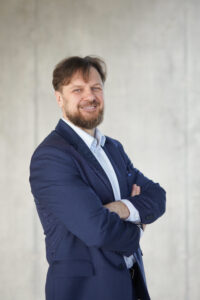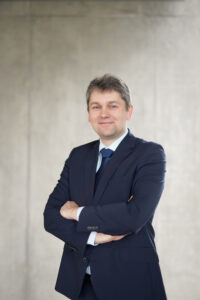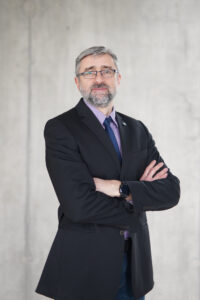Every year, researchers of the Faculty of Mechanical Engineering and Design at Kaunas University of Technology (KTU MIDF) actively participate in the calls of the Research Council of Lithuania for proposals for funding of postdoctoral fellowships. The main objective of the postdoctoral fellowship project is to increase the scientific qualification of postdoctoral fellows. It is also an excellent opportunity to carry out research on topics of relevance to society and industry.
During the period 2020-2023, 5 young researchers of the MIDF completed postdoctoral fellowships and 3 more young scientists received funding for postdoctoral fellowships in 2024-2026. Supervisors of the 2024-2026 postdoctoral fellowship projects are Prof. Paulius Griškevičius “Integration of Advanced Non-Destructive Testing into the Composite Materials Ecosystem: Innovation, Reliability and Safety”; Prof. Giedrius Janušas on “Development of Composite Self-Cleaning Nanofiltration Membranes for Water Treatment” and Prof. Regita Bendikienė on “Development and Implementation of a Novel Concept Soil Shaker for Sustainable Agriculture”.
Postdoctoral fellowships for organisational development and networking

“The model of postdoctoral fellowships is also very important for organisational development because we as a Faculty and as a University attract new colleagues and simultaneously expand our network of partners because every new scientist brings personal academic experience. Thus, new partnerships can be formed between the former postdoctoral fellow’s institution and the Faculty, for example, we have already prepared a project application for the development of networks of excellence in cooperation with Bialystok University of Technology under the European Horizon Programme. Another great opportunity to attract new colleagues to the Faculty, which has not yet been fully exploited, is our more active participation in the European Commission’s calls for proposals under the Marie Sklodowska-Curie Actions of the European Horizon Programme for Postdoctoral Fellowships”, says the Dean of the MIDF Dr. Andrius Vilkauskas.
Next generation nanomembranes for water filtration
Head of the Department of Mechanical Engineering Prof. Giedrius Janušas has been the supervisor of 2 PhD students and is currently supervising 5 PhD students in the Mechanical Engineering science field.

This year, professor G. Janušas got funding for the second postdoctoral fellowship project. In March 2024, the professor’s fellow started his research on composite, self-cleaning nanofiltration membranes for water filtration. Membrane filtration is one of the most commonly used methods to remove microplastics (MP) and nanoplastics (NP) which allows for the easy, efficient and environmentally friendly separation of different types of MP/NP particles. Membrane filtration is dependent on the selective permeability of the membrane pores due to pressure differences. However, larger MP particles can quickly clog the membrane pores and reduce the permeability. In addition, the internal electrical charge of MP/NPs causes them to accumulate on the membrane surface which further complicates filtration efficiency. In view of the increasing global demand for drinking water, the project aims to develop a nanofiltration membrane using phase inversion as an environmentally friendly and cost-effective solution for the removal of MP/NP particles from drinking water.
The implementation of the project will also include the examination of contamination mechanisms and mitigation strategies using a vibrational surface cleaning based on ultrasonic excitation which parameters correlate with the properties of MP/NPs.
“Postdoctoral fellowship projects are an excellent opportunity for research teams to attract young researchers. A fellow is a young colleague whose enthusiasm is often contagious to other members of the research team. This is a great opportunity for the fellow to establish himself/herself as an independent scientist, make contacts with international partners and join international teams”, says Prof. Giedrius Janušas.
Machine learning algorithms and advanced data processing technologies for the analysis of composite structures
Paulius Griškevičius is a professor at the Department of Mechanical Engineering, teaching strength of materials, composite mechanics, who has supervised nearly a hundred bachelor’s and master’s students of Mechanical Engineering and Aerospace Engineering study programmes. Prof. Paulius Griškevičius has supervised 2 PhD students who have successfully defended their PhD theses and is currently supervising one PhD student.

From 2021 to 2023, he supervised the postdoctoral fellowship project “Damage Control of Lightweight Structures Using a Combined Experimental-Numerical Approach”, and this year he has started to supervise the project “Integrating Advanced Nondestructive Testing into the Composite Materials Ecosystem: Innovation, Reliability and Safety”.
“Postdoctoral fellowship projects are useful not only to the fellow who gains new research experience but also to the supervisor or the host department, where part of the knowledge gained from the research remains. During the first postdoctoral fellowship in 2021-2023, the fellow applied the capacities of an image-based numerical correlation system to measure the deformation fields on the surface of a structure and developed a system for detecting structural damage. The fellow of the new project starting in 2024 will partially continue working on the topics and activities of the previous project. The aim is similar: damage control of composite structures using experimental-numerical methods, but this project will integrate machine learning algorithms and advanced data processing technologies, which should allow for faster and more accurate assessment of the state of the structure“, explains Prof. Paulius Griškevičius.